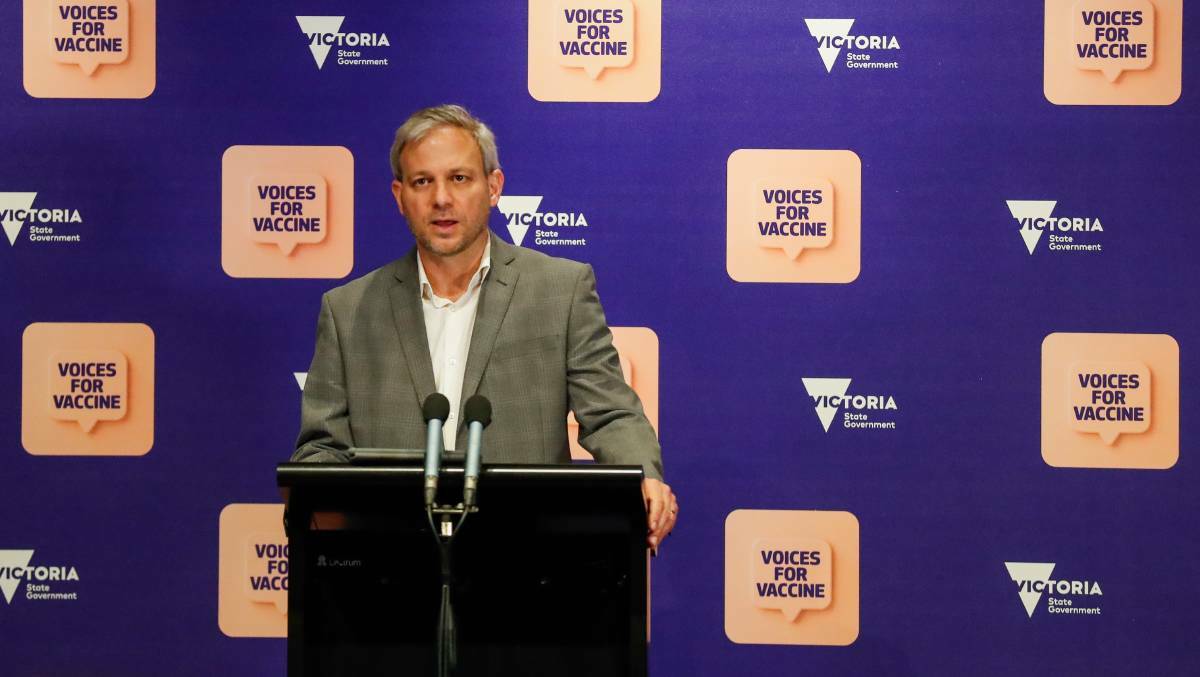Victoria's chief health officer has warned regional Victorians to prepare for an increase in COVID-positive travellers as the state is expected to reach the 80 per cent double-dose mark and open up further on Friday.
Subscribe now for unlimited access.
$0/
(min cost $0)
or signup to continue reading
Mr Sutton said protections from first and second-dose vaccination would be critical for every local government area across the state come Friday, especially in the regions.
"As we open up further, on Friday night, there will be more individuals who are infectious going to regional Victoria," he said.
"We have some areas of the state that have been relatively untouched by COVID so they have to ready themselves for the fact that they will be more cases out and about across all areas of the state especially with long weekends with the opportunity for Victorians to travel across the state and so, the protection from first dose and then full dose vaccination is really critical again for every single LGA across the state."
But he said the vaccination rate in regional Victoria stood at over 90 per cent.

"Victoria has absolutely fantastic first those coverage and screaming along for second those coverage again, no-one left behind, there is no LGA left behind in regional Victoria. They are all at or above 94 per cent coverage, the great majority of them above 95 per cent first those coverage, that is more equitable for a region in any other jurisdiction in Australia."
The praise comes as the state reached the 75.4 per cent fully-vaccinated mark today.
There were 1510 new COVID cases recorded on Tuesday, an increase of 49 from yesterday.
Sadly, four COVID-positive Victorians died overnight, including three men and women in their 80s. It takes the Delta outbreak's toll to 234.
There are 817 coronavirus patients in hospital (87 per cent not fully-vaccinated) and of those 147 are in intensive care (96 per cent not fully-vaccinated) and 88 are on a ventilator. The seven-day average for hospitalisations has decreased slightly to 789.
Meanwhile, the Victorian Government introduced a bill into parliament which would replace the existing state of emergency powers.
The proposed pandemic-specific laws - reforms to the Public Health and Wellbeing Act 2008 - are modelled on New Zealand and NSW legislation.
READ MORE:
Under the proposal, a state of emergency declaration can initially be made for only four-weeks but can be renewed for three-month periods until the pandemic no longer presents a serious risk to the community.
This framework will replace the current system where state of emergency powers must be renewed every four weeks up to a maximum of only six to nine months.
Under the new framework, the minister for health can also issue pandemic orders after the premier declares a pandemic and after seeking advice from the CHO.
These orders will replace the current public health directions and can include orders to restrict or limit movement, detain or quarantine infectious people or groups of people, as well as regulate activities.
The minister will also be able to issue a pandemic order to a specific classification of person or group depending on their location, participation at an event or activity, or a particular characteristic such as age, vaccination status, residence, occupation or living arrangements.
Victorian Premier Daniel Andrews said the proposal would take into account greater accountability and transparency.
"We made a commitment some time ago that we will introduce pandemics specific laws that we will have a set of measures that were not written with a hypothetical in mind, but with the product of lessons and experiences that we have all been through, all of us, all over last 20 plus months," he said.
"That is exactly the framework that we have introduced into parliament. This is modelled on the New Zealand law, there are elements of what happens in New South Wales and other states also.
"We have gone beyond that in terms of accountability and transparency. They yield expert and the broadest view. That should not be taken as a criticism of anybody who has been involved in our pandemic response, particularly the public health team.
"Under the current law, their job is to be first and foremost concern with public health. That is what you want when you don't have the vaccine. Once you move to a vaccinated economy and their vaccinated community and you have the protections of those vaccines, when you are in this stage of this pandemic, you need to have a broader focus. That is exactly what these new arrangements will underpin."

